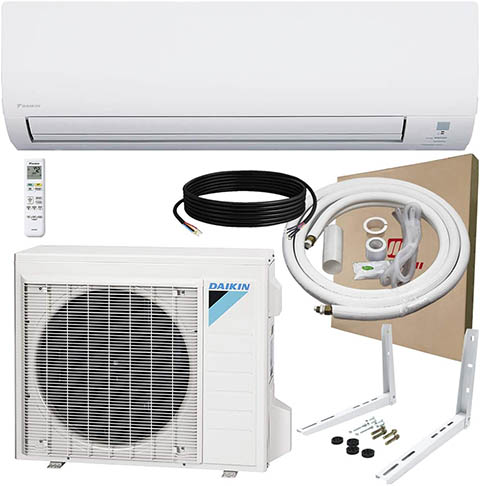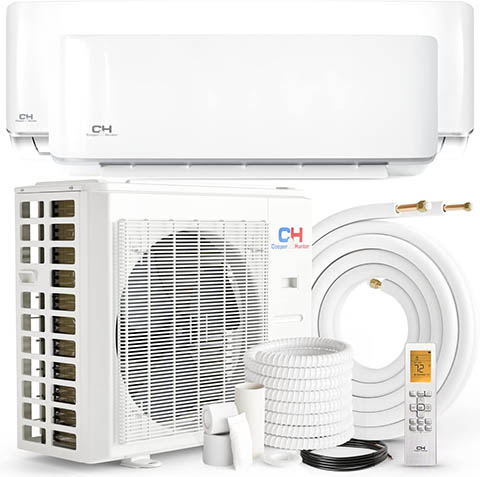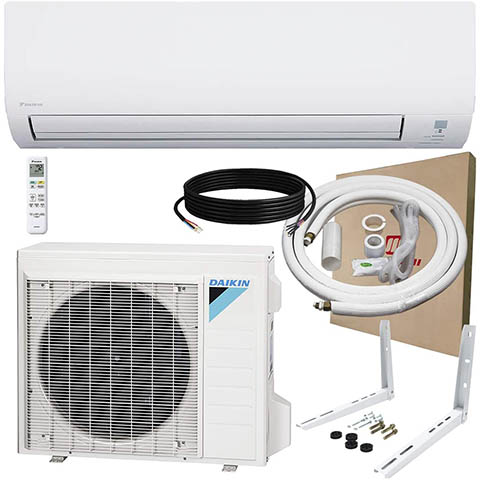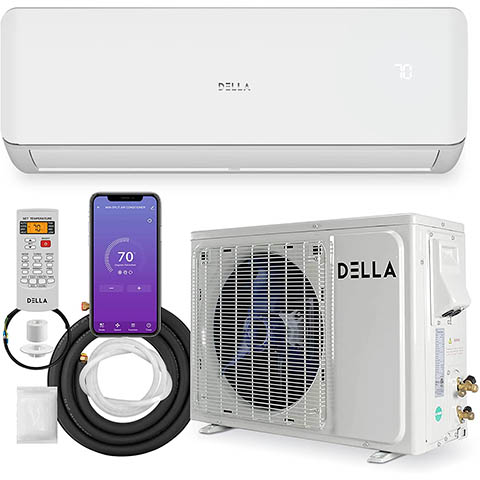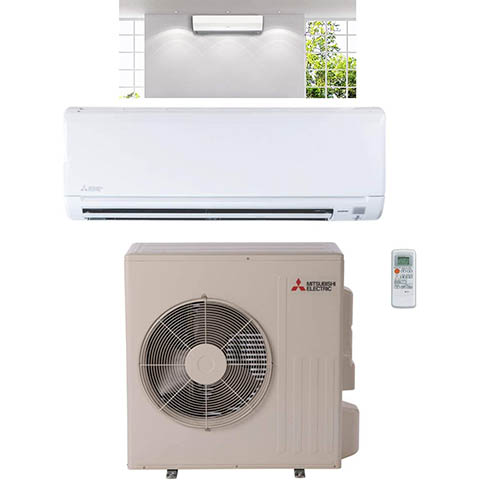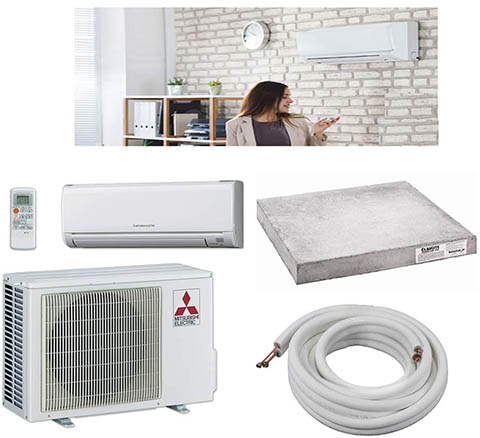8 Best Heat Pumps For Cold Weather in 2025: Reviews & Top Picks
-

- Last updated:
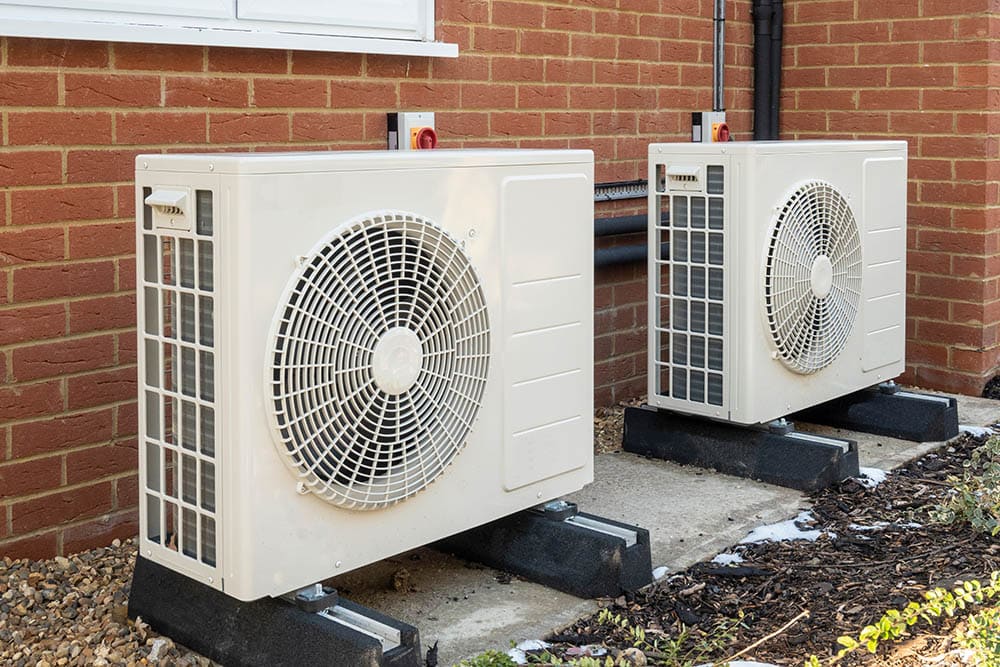

Heat pumps are essential components that work in place of traditional air conditioners. The problem is that not all heat pump systems are made for cold environments. Plenty of homes and buildings persevere through very cold winters with below-freezing or even subzero temperatures. The good news is that plenty of heat pumps can withstand extremely cold temperatures.
This guide will give eight great examples of cold weather-resistant heat pumps as well as tips, tricks, and information to help you make the best choice going forward.

A Glance at Our Winners in 2025
| Rating | Image | Product | Details | |
|---|---|---|---|---|
Best Overall
 |
 |
MAXWELL 12,000 BTU Low Ambient Ductless |
|
CHECK PRICE |
Best for Extreme Cold

|
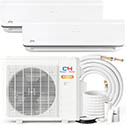
|
Cooper & Hunter Hyper Heat Dual Zone |
|
CHECK PRICE |
Best Power In Cold Weather

|
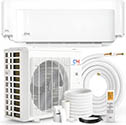
|
Cooper & Hunter 18,000 BTU Dual 2 Zone Wall Mount |
|
CHECK PRICE |
|
Best Small Size
|
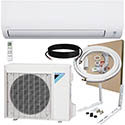
|
MAXWELL Daikin Aurora Heat Pump System |
|
CHECK PRICE |
|
Most Efficient In Cold Weather
|
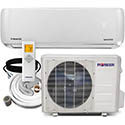
|
PIONEER Air Conditioner Mini Split Heat Pump |
|
CHECK PRICE |
The 8 Best Heat Pumps for Cold Weather
1. MAXWELL 12,000 BTU Ductless Mini-Split Inverter Heat Pump System — Best Overall
| Power Supply: | 230 Volts (DC) |
| Heating Power: | 12,000 BTU |
| Cooling Power: | 12,000 BTU |
| SEER Rating: | 20 |
| Lowest Air Temperature Allowed: | -13º F |
The Daikin Aurora is a fantastic miniature ductless split heat pump system. It provides a well-rounded suite of features that cover all areas. It has decent power output at 12,000 BTUs and a good energy efficiency rating. The unit runs off of DC power and is not too cumbersome or small. The 12,000 BTU heating power is above average without sacrificing efficiency or size. However, it only comes with a 15-foot length of power installation, which is considerably shorter than the 25-foot lengths other units come with.
The best part about the Daikin Aurora is that it does not sacrifice power for cold weather efficiency. It can run in temperatures as low as -13º F. That means you don’t have to worry about the unit in most climates. The only drawback is that it requires frequent defrosting in certain conditions. The condenser freezes up but will quickly thaw.
Regarding power, efficiency, and cold-weather durability, the Daikin Aurora is simply the best overall heat pump available this year.
- Good cooling power
- Operates in extreme cold
- Great heating coverage
- Defrosts often
- Short 15-foot install kit
2. Cooper & Hunter Hyper Heat Pump Air Conditioner System — Best For Extreme Cold
| Power Supply: | Corded Electric |
| Heating Power: | 9,000 BTU |
| Cooling Power: | 9,000 BTU |
| SEER Rating: | Meets the standard |
| Lowest Air Temperature Allowed: | -22º F |
This heat pump is one of the best options for cold climates because of its intense temperature resistance. It can withstand outdoor temperatures that drop as low as -22º F. That temperature rating is one of the lowest available on the market. The Cooper & Hunter Hyper Heat Dual Zone Mini Split Heat Pump Air Conditioner System comes ready to install and run right out of the box.
It includes an ample 25ft copper wire installation kit, comes pre-charged, and you don’t have to have someone charge it after you install it. Also, it includes a seven-year warranty. This unit provides great cooling and heating coverage, even in the coldest weather. The downside is this unit is very heavy and has to be shipped via freight on a pallet. It is best installed with two people. All in all, this is one of the best split heat pumps you can buy for frigid temperatures.
- Functions as low as -22º F
- Comes pre-charged
- Good warranty
- Heavy
- Ships on a large pallet
3. Cooper & Hunter 18,000 BTU Wall Mount Ductless Mini Split Heating System — Best Power In Cold Weather
| Power Supply: | 230V Copper Wire |
| Heating Power: | 18,000 BTU |
| Cooling Power: | 17,000 BTU |
| SEER Rating: | 21.3 |
| Lowest Air Temperature Allowed: | -13º F |
Many cold-weather heat pumps tend to be on the small side. That is not the case with this Cooper & Hunter unit. When you want considerable heating power in icy environments, you cannot do better than this heat pump system. It can run in temperatures as low as -13º F while still outputting 18,000 BTUs of heating power. The heat-to-ambient temperature ratio is one of the best available.
It is also energy efficient, with a SEER rating of 21.3, which is above average. It is also Energy Star rated, and you won’t waste much money on electricity. This unit also has a seven-year warranty and quiet running technology for sensitive areas. The heat pump weighs 180 pounds, and it’s better to have an assistant help you install it.
- Plenty of heating power
- Works in extreme cold
- Energy efficient
- Heavy
4. MAXWELL Daikin Aurora Mini-Split Heat Pump System — Best Small Size
| Power Supply: | 230V (DC) |
| Heating Power: | 9,000 BTU |
| Cooling Power: | 9,000 BTU |
| SEER Rating: | 20 |
| Lowest Air Temperature Allowed: | -13º F |
The Daikin Aurora 12k BTU Mini Heat Pump system is the perfect small-sized heat pump and is great for cabins or other small spaces that are consistently cold. It can function at temperatures as low as -13º F and can withstand all but the most extreme weather. The unit is not very large, it is easy to install, and it is not heavy. It even comes with a comprehensive 12-year warranty from the manufacturer, so you know it will last a long time.
The biggest downside is that it can only heat 350 square feet comfortably. It will not handle large spaces very well, and straining the system leads to frequent defrosting intervals. But if you are looking for a small heat pump, you can install it yourself.
- Compact
- Lightweight
- Efficient
- Small coverage
- Frequent defrosting
5. PIONEER Air Conditioner Mini Split Heat Pump — Most Efficient In Cold Weather
| Power Supply: | 120V |
| Heating Power: | 9,800 BTU |
| Cooling Power: | 9,000 |
| SEER Rating: | 22.5 |
| Lowest Air Temperature Allowed: | 17º F |
If you are worried about energy efficiency ratings, this is a heat pump you consider. It is the most efficient heat pump on this list; the SEER rating of 22.50 is the best by far. That means this heat pump will not use as much energy as other brands. However, energy efficiency comes with a power tradeoff. The Pioneer will not work well in large spaces.
In fact, the maximum coverage is just 350 square feet. It is best suited for an ice fishing hut or single room rather than a large space. The good news is that the Pioneer is very lightweight, quiet, and compact. That makes it perfect for certain situations where you do not need a giant, noisy heat pump to get the job done.
- Small
- Lightweight
- Most energy efficient
- Small coverage
- Higher temperature floor
6. DELLA Wifi-Enabled Mini Split Heat Pump System — Best High Tech Heat Pump
| Power Supply: | 230V |
| Heating Power: | 18,000 BTU |
| Cooling Power: | 18,000 BTU |
| SEER Rating: | 17 |
| Lowest Air Temperature Allowed: | 12º F |
Sometimes, heating and cooling equipment components seem stuck in the past. Heat pumps are one of those products. Sure, they’ve become more efficient but haven’t been upgraded much. That is where DELLA comes in. They are out to rectify the problem of outdated heat pumps. The DELLA 18k BTU unit has many modern features, including remote temperature sensing, a self-cleaning mode, automatic defrosting, a quiet sleep mode, and smartphone connectivity.
This unit brings heat pumps into the 21st century. If you are looking for a smart heat pump, the Della is the closest you are going to get. The only problem is it does not have as low of a temperature floor as other models. But if you are someone who likes gadgets and likes to have everything integrated, the DELLA is the ideal heat pump.
- Lots of innovation
- Smartphone compatible
- Affordable
- Not as weather-resistant
- Not super energy efficient
7. Mitsubishi Heat Pump Ductless Mini Split System — Best Large Heat Pump For Cold Weather
| Power Supply: | 230V |
| Heating Power: | 27,600 BTU |
| Cooling Power: | 22,400 BTU |
| SEER Rating: | 20.5 |
| Lowest Air Temperature Allowed: | -4º F |
Sometimes small split system heat pumps just won’t cut it. If you need a large heat pump that can work in cold temperatures, look no further than the Mitsubishi 24k BTU Split System Heat Pump. This system can put out an impressive 27,600 BTUs of heating power in temperatures as low as -4º F. That is perfect for a basement, small home, or workspace. It is also designed to run quietly in crowded spaces. Even in the summer, this unit can maintain good cooling power with 22,400 BTUs.
The biggest drawback to the Mitsubishisi is that an HVAC professional must install it. The buyer can install some ductless systems, but this one requires a pro. That will add time and money to getting this system up and running.
- Tons of power
- Works well in subzero temperatures
- Quiet
- Must be installed by a professional
- Pricey
8. Mitsubishi Mini-Split Inverter Cool & Heat Pump System — Most Reliable
| Power Supply: | Corded Copper (DC) |
| Heating Power: | 18,000 BTU |
| Cooling Power: | 17,200 BTU |
| SEER Rating: | 18 |
| Lowest Air Temperature Allowed: | 5º F |
If you are looking for a heat pump that will last and has a proven track record, then Mitsubishi should be on your list. Mitsubishi is an old company based in Japan that has provided excellent products for decades. This Mitsubishi Split Heat Pump System comes with all of Mitsubishi’s quality guarantees and provides excellent power and coverage.
It can heat or cool a space up to 750 square feet, which is a sizable space. It can also run in temperatures as low as 5º Fahrenheit, which is very low for a unit of this size. It also features a dehumidifier to prevent your room from getting muggy and a quiet operation mode for nighttime. The only drawbacks are that this unit is expensive compared to some others and it can only handle low temperatures.
- Quality Mitsubishi construction
- 750 square feet of coverage
- Quiet running mode
- Expensive
- Not as temperature resistant as others

Buyer’s Guide: How to Select the Best Heat Pumps For Cold Weather
Different Types of Heat Pumps
There are three types of heat pumps available on the market: air-source, split-ductless, and geothermal. Knowing the difference between these three types is crucial for determining which heat pump is right for you. The most common type of heat pump is an air-source heat pump. HVAC professionals often install the pumps, which include an outdoor unit and an indoor air handler.
The second most common type of heat pump is the split-ductless variety. You can install them on your own because they do not require ducts to be in place to function. These pumps often only heat one room or a small space.
Lastly, there are geothermal heat pumps. They use buried pipes to maintain constant ambient heat. Geothermal heat pumps are the least common because they require a lot of room and money. A typical geothermal system can cost up to $30,000 to install.
Always Check The Temperature Ratings
Heat pumps all have an official temperature rating. The numbers dictate which temperatures the system can run at while outside. Even if the temperature numbers are not readily available, they should be buried in the technical specifications. Always double-check the allowable temperature range before buying.
We tried to put as many cold weather pumps on this list as possible, but check the temperature range if you are looking at heat pumps on your own. You will be surprised to find that some of the units on the market have ranges that hardly dip below freezing. If you buy a system with a 15º F low and have to live through a sub-zero cold snap for a week, you will be very cold.
What Is SEER?
SEER stands for Seasonal Energy Efficiency Ratio. It is a metric the federal government uses to regulate the efficiency of air sources and split-ductless air systems. The higher the SEER rating, the more efficient the heat pump. A more efficient heat expends less energy on heating and cooling the room. The minimum federal guideline for heat pump SEER ratings is 14.
Another energy efficiency rating you might see while shopping for heat pumps is the Heating Seasonal Performance Factor (HSPF). This rating is less commonly used but applies to heat pumps. A good HSPF rating is more important for cold-weather heat pumps than SEER, but the HSPF rating is harder to find than SEER.
Consider The Noise
Heat pumps can be noisy. Some product descriptions provide an average noise level in decibels, but many don’t. Some heat pumps are known to be extremely noisy. Since many of these products require an indoor wall-mounted air handler, the noise factor can a significant concern.
You do not want to install a brand-new heat pump system next to your bed only to find out that the noise will keep you up all night. Heat pumps are usually noisey, but some come with low-noise modes for bedrooms.
See also: Why Does My Heat Pump Make a Loud Noise When It Shuts Off? Is It Normal?
Know Your Space
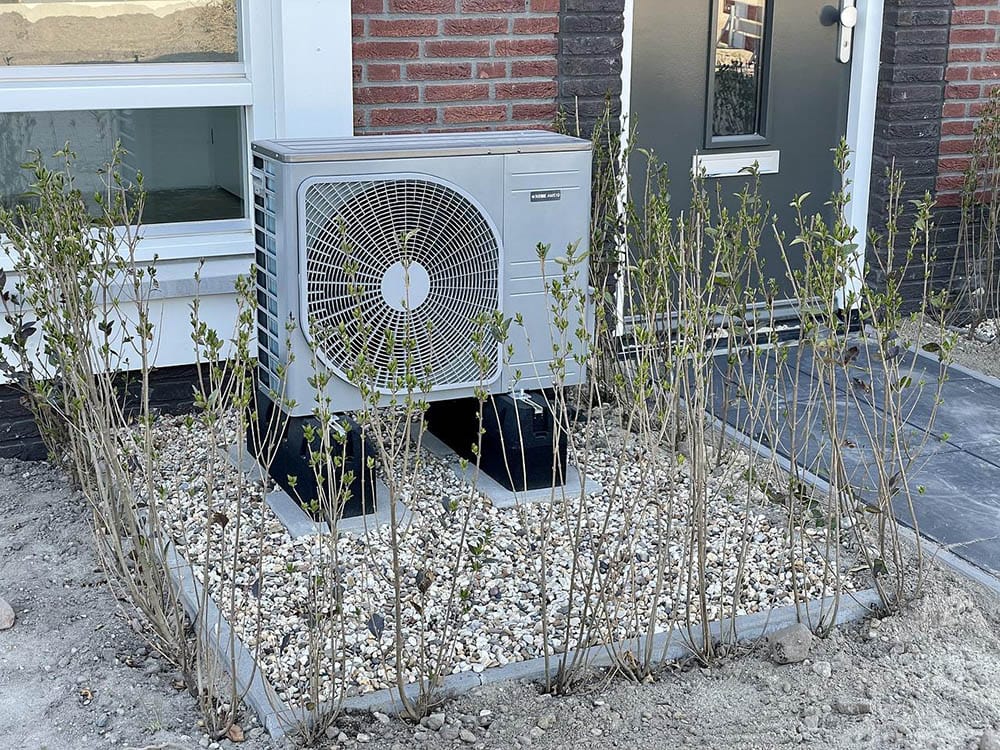
Most of the heat pumps that you can buy and install are split-ductless heat pumps. They are often made to heat one room and offer varying coverage. Before taking the plunge on a heat pump, it is best to know the space you will be installing it in. Is the room drafty? How large is the space? How hot/cold does it get normally? These are essential questions to ask before purchasing a heat pump.
One of the most common complaints online is from people who installed undersized heat pumps and complained that they do not heat and cool appropriately. It is frustrating to find a heat pump with great reviews only to realize it is made to heat 350 SF when you need to heat 700 SF. Even if the BTU numbers look good, if the air handler is not equipped to pump air into a larger space, it won’t heat efficiently.
Know your space before you buy. It could save you a lot of time, money, and effort.

Conclusion
The MAXWELL 12,000 BTU still provides the best overall value regarding price, efficiency, and reliability. However, Cooper & Hunter Hyper Heat Dual Zone is still a solid contender as the second pick and provides significant savings. With this guide, choosing your next cold-weather heat pump should be a breeze. Even if you don’t select any of the brands on our list, we are confident you will have all the information needed to make the best decision.
See also: How Many Watts Does a 4-ton AC Unit Use? Do They Consume Lots of Power?
Featured Image Credit: Nimur, Shutterstock
Contents
